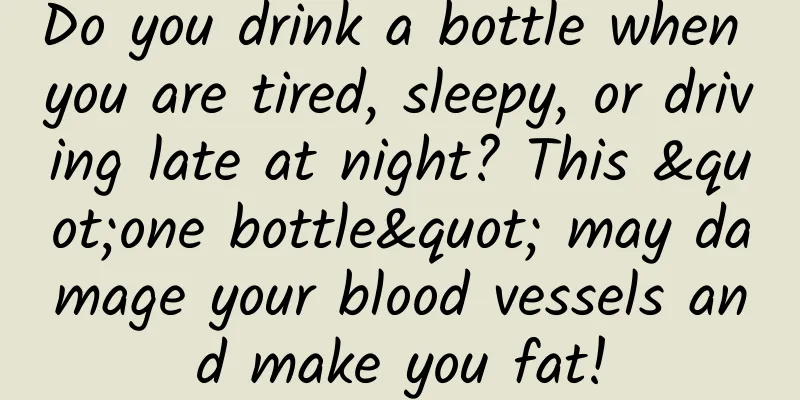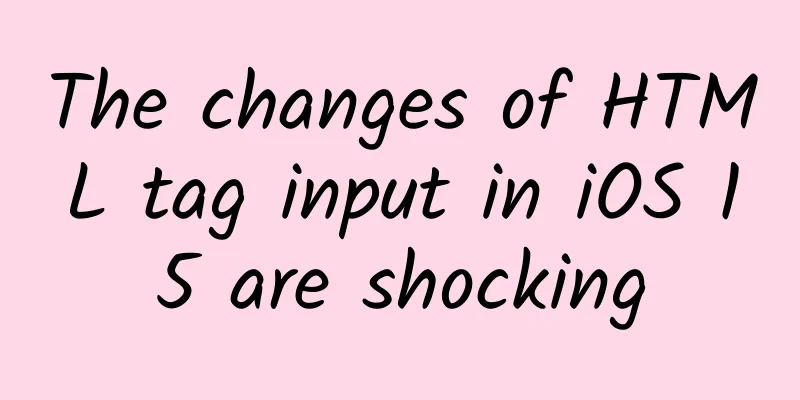Do you drink a bottle when you are tired, sleepy, or driving late at night? This "one bottle" may damage your blood vessels and make you fat!

|
"Have a bottle when you are tired or sleepy, have a bottle when driving late at night", this is a common promotional phrase for many functional drinks. In recent years, the functional beverage market has developed rapidly. Data shows that China's functional beverage market rose rapidly between 2007 and 2017, and has been growing steadily. Energy drinks are now common in major supermarkets. Many people think they are healthier than ordinary sweet drinks and are also a mental support for workers who are forced to stay up late. However, there is recent news that drinking too much energy drinks may cause anxiety and insomnia. This makes many workers tremble in their hearts: Is this true? The energy drink in their hands instantly loses its fragrance. How harmful is it to stay up late? Should we drink energy drinks on a regular basis? Let's talk about energy drinks. Can drinking functional drinks refresh you and fight fatigue? For modern workers, endless work, irresistible social interactions, and indispensable relaxation and entertainment have made staying up late a commonplace. We don’t need to introduce the harm of staying up late. Some people may think that although staying up late is harmful to health, functional drinks are “rich in nutrition” and can be consumed when staying up late to refresh the mind and fight fatigue! So what is this kind of drink like? According to the provisions of GB/T 10789-2015 General Rules for Beverages, functional drinks are a type of special-purpose beverages. Functional drinks do not contain alcohol, but contain caffeine, vitamins, and a series of "functional ingredients" such as taurine, ginseng, and guarana. Among them, caffeine can excite the sympathetic nerves, stimulate the brain to wake it up, promote blood circulation, improve attention, and enhance alertness, thereby relieving fatigue; taurine can quickly remove free radicals, regulate calcium ion transport, and also play an anti-fatigue role; other ingredients also help to reduce the effects of fatigue. Animal experiments have shown that giving mice energy drinks can improve their exercise endurance, increase liver glycogen content, and reduce lactic acid levels and urea nitrogen content after exercise, and have an anti-fatigue effect on the body. Moreover, the more energy drinks are consumed, the more obvious the effect. Therefore, if we only look at it from this perspective, drinking functional drinks when staying up late may indeed play a certain role in fighting fatigue. Many friends drink a can of functional drinks when staying up late, and they do feel "energetic again". Do energy drinks have “side effects”? Energy drinks generally taste good and are delicious, which makes it easy for people to drink too much. Some people even treat them as ordinary drinks and drink bottle after bottle, which leads to excessive intake of caffeine and sugar. First, let's talk about caffeine. Excessive intake of caffeine is harmful to health and can easily cause insomnia, panic, anxiety and other symptoms, and may also make people dependent. For example, today you drink a can of energy drink to be full of energy, but if you drink it frequently, you may need N+1 cans to be effective, which will lead to more and more caffeine intake. Studies have shown that drinking 250 ml of energy drinks a day will increase the risk of anxiety and depression in young adults. For teenagers, the ability to metabolize caffeine is weaker than that of adults. If they drink energy drinks frequently, it will not only increase the risk of depression, but also reduce the sleep time of teenagers, leading to sleep disorders. In addition, excessive intake of energy drinks can lead to changes in endothelial function and cause acute endothelial disorders. It was reported that a 14-year-old boy drank energy drinks for 5 consecutive days and participated in a running competition. He felt chest pain and discomfort, and an electrocardiogram showed atrial fibrillation. Another 28-year-old man who was originally healthy drank 7 to 8 cans of energy drinks before participating in a motorcycle cross-country race, which caused cardiac arrest. The "Scientific Consensus on Coffee and Health" released by five institutions including the China Food and Health Information Exchange Center, the Institute of Nutrition and Health of the Chinese Center for Disease Control and Prevention, and the Food Hygiene Branch of the Chinese Preventive Medicine Association recommends that the average adult's daily caffeine intake should be controlled within 400 mg. For example, the functional beverage of a certain brand that is commonly consumed in the picture below has a label on the bottle that says each can contains 50 mg of caffeine. Figure: E-commerce platform Although some brands of energy drinks do not indicate the caffeine content on the bottle, this does not mean that there is no caffeine. The content may be very high. Secondly, excessive intake of functional drinks will also lead to excessive sugar intake. The "Dietary Guidelines for Chinese Residents" recommends that the daily sugar intake of each person should be controlled within 25 grams, and functional drinks generally have a high sugar content. The above-mentioned evaluation shows that among the six common functional drinks tested on the market, the lowest sugar content is 1.32 grams per can, and the highest is 37.62 grams per can. Drinking just one can exceeds the 25-gram standard. Copyrighted stock images, reprinting and using may cause copyright disputes Excessive sugar intake not only increases the risk of tooth decay, but also increases the risk of obesity and chronic diseases. According to statistics, nearly 13,000 deaths in my country in 2017 alone can be attributed to coronary heart disease and diabetes caused by sweet drinks. Therefore, don’t drink functional drinks recklessly just because you think they can refresh your mind and contain some nutrients. You can make better use of them by controlling the amount. Can everyone drink functional drinks? Although drinking energy drinks can help you feel refreshed, it is not recommended for everyone. The following five types of people should especially control the amount of energy drinks they drink and avoid drinking them if they feel uncomfortable: 1 Pregnant women and breastfeeding women The labels of most functional drinks will state that they should not be consumed by pregnant women or breastfeeding women to avoid affecting the health of the fetus and baby. 2 Children and adolescents This group of people has a lower ability to metabolize caffeine, and excessive drinking can cause greater harm. 3 Patients with gastrointestinal diseases Caffeine stimulates stomach acid secretion, which may cause discomfort. 4 People taking medication People who are taking certain medications should not drink functional drinks without authorization. It is recommended to consult a doctor to avoid affecting the efficacy of the medication. 5 Drinking crowd Do not drink energy drinks while drinking alcohol, as it will make people so excited that they don’t realize they are drunk, and thus drink more alcohol, increasing damage to the body. Summarize: The best way to avoid the harm caused by staying up late is not to stay up late. It's understandable to drink a bottle occasionally to refresh yourself, or when you're tired or sleepy, but don't use it to prolong your life! If you're really tired, just take a break! Drinking energy drinks in moderation can help you perk up and face things and work more clearly. But drinking too much can increase the risk of anxiety, depression, obesity, chronic diseases and sleep disorders. Finally, a reminder: functional drinks are not medicine and cannot cure diseases. References [1] Shi Wen, Li Zhou. Analysis on the current status and development trend of China's functional beverage market[J]. Food and Fermentation Technology, 2020, 56(05):97-100+104. [2]. Fu Changgeng, Long Linzi. Research progress on lifestyle and cardiovascular risk[C]// Meeting and academic seminar of the Health Preservation and Rehabilitation Medicine Professional Committee of the Chinese Association of Integrated Traditional Chinese and Western Medicine. 0. [3] Geng Na, Han Qianyun, Guo Mengdi, Ni Yuanying. Research status and development prospects of anti-fatigue beverages[J]. Food Industry, 2018, 39(07): 264-267. [4] Cai Yuhang, Rong Yaozhong, Cheng Nengneng, Luo Yin, Chen Wei. Experimental study on the anti-fatigue effect of functional beverages[J]. Food Industry Science and Technology, 2011, 32(09): 167-168+173. DOI: 10.13386/j.issn1002-0306.2011.09.002. [5] Kong Weimin, Zhou Huanhuan, Gao Xin, Lou Qingqing. Effects of excessive consumption of functional drinks on cardiovascular and nervous systems in children and adolescents[J]. Chinese Journal of Public Health, 2015, 31(10): 1361-1364. [6]Adam J Berger and Kevin Alford. Cardiac arrest in a young man following excess consumption of caffeinated “energy drinks”. Med J Aust 2009; 190 (1): 41-43. [7]https://mp.weixin.qq.com/s/LZQtnXf4rWK-yQrSUbakvA Planning and production Author: Xue Qingxin, member of Chinese Nutrition Society, registered nutritionist, health manager, public nutritionist Review | Ruan Guangfeng, Deputy Director of Kexin Food and Health Information Exchange Center Planning丨Ding Zong Editor: Ding Zong Proofread by Xu Lai and Lin Lin |
Recommend
The most tricky kind of meat in supermarkets, I don't recommend buying it, it's a waste of money
In the past two years, the price of pork was rela...
How much does it cost to produce a Tangshan sports mini program? What is the price quote for making Tangshan sports mini program?
The factors affecting the quotation of Tangshan S...
If you only have 5 seconds, can your copy capture the user?
The world is so busy, no one will waste one more ...
Why are vest apps so popular?
A fake APP is a small APP developed by developers...
FIIL DIVA headphone experience: Wang Feng spent a year to become a better product manager
In less than a year, Wang Feng brought out his se...
This is the Chaka Salt Lake, which is enough to feed people for 70 years! Satellite view →
Recently, affected by the discharge of nuclear co...
Top 10 brand live streaming marketing models in 2021!
For most brands, live streaming has become a regu...
Introduction to Baidu search promotion advanced precise matching method!
What is Advanced Exact Match Enabling the advance...
How to save your fragile stomach after a big meal? 11 probiotics reviews
After eating and drinking a lot throughout the Sp...
Shopping and short video apps, why can they always guess your favorites?
Have you ever experienced the pleasure of shoppin...
"Not being able to distinguish between left and right rotations" may be fatal. The Nobel Prize in Chemistry has solved a "thorny" medical problem
In the early 1960s, a notorious drug safety incid...
Event Operation | How to organize an event with a high degree of completion?
How can an operator carry out an activity more sc...
Faced with the cold winter of VR market, Sony, Samsung, Google and HTC decided to join forces to keep warm
Looking back at 2016, the term VR suddenly appear...
Interpreting ASP.NET 5 & MVC6 Series (4): Core Technology and Environment Configuration
asp.net 5 is the next generation of asp.net. This...









